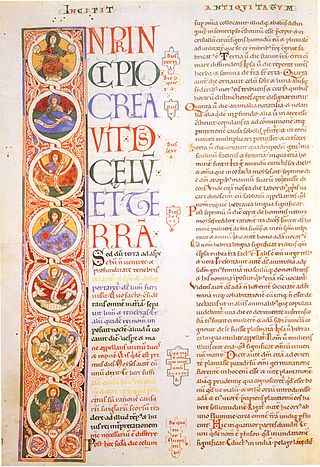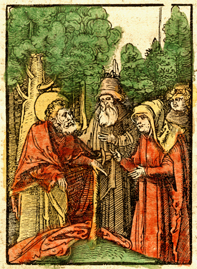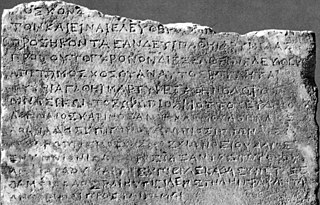Related Research Articles
The Essenes were a mystic Jewish sect during the Second Temple period that flourished from the 2nd century BCE to the 1st century CE.

The extant manuscripts of the book Antiquities of the Jews, written by the first-century Jewish historian Flavius Josephus around AD 93–94, contain two references to Jesus of Nazareth and one reference to John the Baptist.
Flavius Josephus was a 1st-century Roman–Jewish historian and military leader. Best known for writing The Jewish War, he was born in Jerusalem—then part of the Roman province of Judea—to a father of priestly descent and a mother who claimed royal ancestry.
The Sicarii were a splinter group of the Jewish Zealots who, in the decades preceding Jerusalem's destruction in 70 CE, strongly opposed the Roman occupation of Judea and attempted to expel them and their sympathizers from the area. The Sicarii carried sicae, or small daggers, concealed in their cloaks. At public gatherings, they pulled out these daggers to attack Romans and alleged Roman sympathizers alike, blending into the crowd after the deed to escape detection.
The Sadducees were a socio-religious sect of Jewish people who were active in Judea during the Second Temple period, from the second century BCE through the destruction of the Temple in 70 CE. The Sadducees are often compared to other contemporaneous sects, including the Pharisees and the Essenes.

The First Jewish–Roman War, sometimes called the Great Jewish Revolt, or The Jewish War, was the first of three major rebellions by the Jews against the Roman Empire, fought in Roman-controlled Judea, resulting in the destruction of Jewish towns, the displacement of its people and the appropriation of land for Roman military use, as well as the destruction of the Jewish Temple and polity.

Antiquities of the Jews is a 20-volume historiographical work, written in Greek, by historian Flavius Josephus in the 13th year of the reign of Roman emperor Flavius Domitian which was around CE 93 or 94. Antiquities of the Jews contains an account of the history of the Jewish people for Josephus' gentile patrons. In the first ten volumes, Josephus follows the events of the Hebrew Bible beginning with the creation of Adam and Eve.

The Jewish War or Judean War, also referred to in English as The Wars of the Jews, is a book written by Josephus, a first-century Roman-Jewish historian. It has been described by Steve Mason as "perhaps the most influential non-biblical text of Western history".

The siege of Jerusalem of 70 CE was the decisive event of the First Jewish–Roman War, in which the Roman army led by future emperor Titus besieged Jerusalem, the center of Jewish rebel resistance in the Roman province of Judaea. Following a brutal five-month siege, the Romans destroyed the city and the Second Jewish Temple.

Matthew 3:5 is the fifth verse of the third chapter of the Gospel of Matthew in the New Testament. The verse occurs in the section introducing John the Baptist with this verse describing his popularity in the region.
Bruce Manning Metzger was an American biblical scholar, Bible translator and textual critic who was a longtime professor at Princeton Theological Seminary and Bible editor who served on the board of the American Bible Society and United Bible Societies. He was a scholar of Greek, New Testament, and New Testament textual criticism, and wrote prolifically on these subjects. Metzger was one of the most influential New Testament scholars of the 20th century. He was elected to the American Philosophical Society in 1986.
Justus of Tiberias was a 1st century Jewish author and historiographer. All that we know of his life comes from the Vita which Flavius Josephus apparently wrote in response to the assertions made by Justus in his History of the Jewish War, published around 93/94 or shortly after 100. Josephus is moreover the only writer to mention this document, but without ever citing the slightest extract. This History published by Justus seems to have disappeared shortly after the publication of the Autobiography of Flavius Josephus, because it is unknown to pagan authors and the Christian authors who mention it only quote what Josephus said.
Harold William Attridge is an American New Testament scholar known for his work in New Testament exegesis, especially the Epistle to the Hebrews, the study of Hellenistic Judaism, and the history of the early Church. He is a Sterling Professor of Divinity at Yale University, where he served as Dean of the Divinity School from 2002 to 2012, the first Catholic to head that historically Protestant school.

The lesser-known Arch of Titus was a triple bay arch erected at the eastern end of the Circus Maximus by the Senate in A.D. 81, in honour of Titus and his capture of Jerusalem in the First Jewish–Roman War. Few traces remain. The inscription, quoted by an 8th-century Swiss monk known only as the "Einsiedeln Anonymous", makes it clear that this was Titus' triumphal arch. Sculptural fragments of a military frieze have been attributed to the arch.
Ananus ben Ananus, d. 68 CE, was a Herodian-era High Priest of Israel in Jerusalem, Iudaea Province. He was the High Priest who ordered the execution by stoning of James, the brother of Jesus, according to the surviving manuscripts of The Antiquities of the Jews. A delegation sent by citizens upset over the perceived breach of justice met Albinus before he reached Judea, and Albinus responded with a letter informing Ananus that it was illegal to convene the Sanhedrin without Albinus' permission and threatening to punish the priest. Ananus was therefore deposed by King Herod Agrippa II before Albinus's arrival and replaced with Jesus ben Damneus.

The Slavonic Josephus is an Old East Slavic translation of Flavius Josephus' History of the Jewish War which contains numerous interpolations and omissions that set it apart from all other known versions of Josephus' History. The authenticity of the interpolations was a major subject of controversy in the 20th century, but the latest scholarship has rejected them.

Ioudaios is an Ancient Greek ethnonym used in classical and biblical literature which commonly translates to "Jew" or "Judean".
Bruce John Malina was an American biblical scholar, noted for his application of social scientific approaches to the Bible.

Meredith J. C. Warren is a Senior Lecturer in Biblical and Religious Studies at the University of Sheffield. She is known for her views on the New Testament and early Judaism as well as for her media appearances for such outlets as The Washington Post, and BBC radio. She is a Metis citizen of the Manitoba Metis Federation.
Caesar’s Messiah is a 2005 book by Joseph Atwill that argues that the New Testament Gospels were written by a group of individuals connected to the Flavian family of Roman emperors: Vespasian, Titus and Domitian. The authors were mainly Flavius Josephus, Berenice, and Tiberius Julius Alexander, with contributions from Pliny the Elder. Although Vespasian and Titus had defeated Jewish nationalist Zealots in the First Jewish–Roman War of 70 AD, the emperors wanted to control the spread of Judaism and moderate its political virulence and continuing militancy against Rome. Christianity, a pacifist and pro-Roman authority religion, was their solution.
References
- ↑ 1989-2011. yorku.ca
- ↑ "Professor STEVE MASON | the University of Aberdeen". Archived from the original on 2013-12-30. Retrieved 2013-09-07.